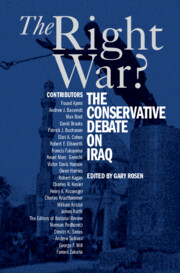Book contents
- Frontmatter
- Contents
- List of Contributors
- Introduction
- 1 Iraq's Future – and Ours
- 2 The Right War for the Right Reasons
- 3 Iraq: Losing the American Way
- 4 Intervention With a Vision
- 5 An End to Illusion
- 6 Quitters
- 7 A More Humble Hawk; Crisis of Confidence
- 8 Time for Bush to See the Realities of Iraq
- 9 Iraq May Survive, but the Dream Is Dead
- 10 The Perils of Hegemony
- 11 Like It's 1999: How We Could Have Done It Right
- 12 Reality Check – This Is War; In Modern Imperialism, U.S. Needs to Walk Softly
- 13 A Time for Reckoning: Ten Lessons to Take Away from Iraq
- 14 World War IV: How It Started, What It Means, and Why We Have to Win
- 15 The Neoconservative Moment
- 16 In Defense of Democratic Realism
- 17 ‘Stay the Course!’ Is Not Enough
- 18 Realism's Shining Morality
- 19 Has Iraq Weakened Us?
- 20 Democracy and the Bush Doctrine
- 21 A Time for Humility
- 22 Birth of a Democracy
- Index
18 - Realism's Shining Morality
Published online by Cambridge University Press: 10 August 2009
- Frontmatter
- Contents
- List of Contributors
- Introduction
- 1 Iraq's Future – and Ours
- 2 The Right War for the Right Reasons
- 3 Iraq: Losing the American Way
- 4 Intervention With a Vision
- 5 An End to Illusion
- 6 Quitters
- 7 A More Humble Hawk; Crisis of Confidence
- 8 Time for Bush to See the Realities of Iraq
- 9 Iraq May Survive, but the Dream Is Dead
- 10 The Perils of Hegemony
- 11 Like It's 1999: How We Could Have Done It Right
- 12 Reality Check – This Is War; In Modern Imperialism, U.S. Needs to Walk Softly
- 13 A Time for Reckoning: Ten Lessons to Take Away from Iraq
- 14 World War IV: How It Started, What It Means, and Why We Have to Win
- 15 The Neoconservative Moment
- 16 In Defense of Democratic Realism
- 17 ‘Stay the Course!’ Is Not Enough
- 18 Realism's Shining Morality
- 19 Has Iraq Weakened Us?
- 20 Democracy and the Bush Doctrine
- 21 A Time for Humility
- 22 Birth of a Democracy
- Index
Summary
We are pleased that president george w. bush achieved an impressive victory over Senator John Kerry – but we do not believe that the president received a clear mandate for conducting foreign policy. Indeed, it was unfortunate that there was no real foreign policy debate during the campaign – and this at a time when the United States must make fateful choices.
The president, understandably, was unwilling to acknowledge serious errors of judgment in the conduct of U.S. foreign policy. Yet Senator Kerry failed to offer a credible alternative. His attacks on administration policy, especially vis-à-vis Iraq, were more nitpicking than a serious evaluation of what went wrong and what lessons the United States should learn.
President Bush built a strong record on the defining issue of our time – fighting terrorism. He destroyed al Qaeda's base in Afghanistan, removing the Taliban from power. And regarding Iraq, there were only two feasible options. One was to offer Saddam a quid pro quo settlement – allowing him and his murderous regime to stay in power in return for verifiably giving up weapons of mass destruction and abandoning his regional pretensions. There was little constituency in the United States for such a course of action. The second was regime change. Senator Kerry himself had voted in 1998 for this option. The Clinton team (many of whom also served as advisors to the Kerry camp) opted for half-measures – conducting regular air strikes against Saddam, attempting (with declining success) to maintain strangulating sanctions, and plotting covert action.
- Type
- Chapter
- Information
- The Right War?The Conservative Debate on Iraq, pp. 204 - 211Publisher: Cambridge University PressPrint publication year: 2005



